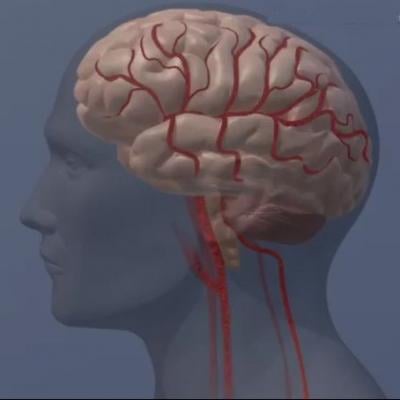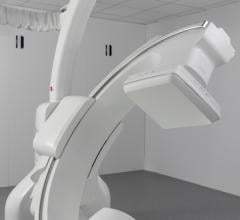
Image courtesy of the American Heart Association
October 30, 2020 — Computed tomography angiogram (CTA) scans may offer fast and early detection of COVID-19 in acute ischemic stroke (AIS) patients, according to new research published in Stroke, a journal of the American Stroke Association, a division of the American Heart Association.
The study, titled "The Utility of Apical Lung Assessment on CTA as a COVID-19 Screen in Acute Stroke," found that in addition to patient-reported COVID-19 symptoms, routine or standard care CTA scans were an accurate screening method for faster detection of COVID-19 since they include imaging of the upper portion of the lungs.
Researchers conducted a retrospective analysis of patients treated for AIS at three hospitals in the Bronx from March 1 to April 30, 2020, the height of the COVID-19 surge in New York City. A total of 57 patients who received a CTA scan within 24 hours of hospitalization for AIS were included in the study. Researchers used CTA scans to evaluate the lung apices (the upper area of the lungs) for signs of COVID-19 pneumonia. They then analyzed the accuracy of using CTA scans for COVID-19 diagnosis alone as well as in combination with patient-reported symptoms, such as cough and/or shortness of breath.
"Every second counts when treating a person experiencing a stroke," said Charles Esenwa, M.D., M.S., lead author of the study, an assistant professor and a stroke neurologist at the Albert Einstein College of Medicine in the Bronx, New York City. "Conducting a CTA is already part of the stroke management process, and these scans provide an opportunity to assess the lungs for signs suggestive of COVID-19. Our team sought to determine if this already necessary scan could have a secondary use of identifying potential COVID-19 patients more quickly than a standard nasal swab COVID-19 test."
The study defined confirmed COVID-19 positive cases from nasal swab PCR-test results, which are the standard required by the U.S. Food and Drug Administration (FDA) for COVID-19 testing, and it can take several days for results. Of the 57 study participants, three were diagnosed with COVID-19 prior to the date when a nasal swab COVID-19 test was administered.
Researchers found that:
- CTA scans in combination with patient feedback to COVID-19 symptom questions were able to diagnose COVID-19 with 83% accuracy before results were received from traditional nasal swab tests in AIS patients.
- 30 of the 57 patients included in the study were COVID-19 positive.
- 20 of the COVID-19 positive patients and 2 of the COVID-19 negative patients had findings highly suspicious for COVID-19 pneumonia on their CTA lung scans.
"In combination with symptoms, CTA scan analysis is relatively accurate in diagnosing COVID-19, even compared to the nasal swab test. Since this analysis is much faster and at no extra cost, we hope it could be incorporated as a rapid diagnosis tool for patients with acute stroke," Esenwa said. "In addition, accurately diagnosing COVID-19 within hours, rather than the sometimes days wait-time to receive the results from nasal swab tests could help protect both patients and medical professionals."
While these findings are promising, the study had some limitations. As there is no universally defined standard for diagnosing COVID-19, the study confirmed infection positivity through the nasal swab COVID-19 test (RT-PCR). Patients who did not have the RT-PCR test performed were excluded from the study. Additionally, diagnostic accuracy may have been higher because the study participants were in an area with higher geographic incidence of COVID-19, which may not be the case in an area with a lower rate of COVID-19 infections.
"Screening questionnaires alone are often inaccurate because of the absence of symptoms or the patient is unable to speak because they are suffering from an acute stroke," Esenwa said. "Early diagnosis via CT scans has helped our center protect other patients and staff through early isolation, and it has also allowed us to start early supportive care for those suspected of having stroke who are COVID-19 positive," Esenwa added.
For more information: www.heart.org


 February 13, 2026
February 13, 2026 









